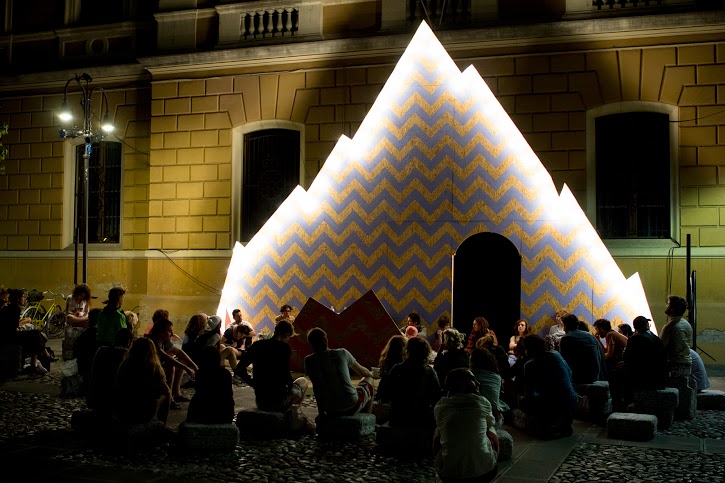This is a time of new beginnings at DAS Graduate School. Not only has the new academic year just started, bringing with it new students and researchers. We also welcome Silvia Bottiroli, the new artistic director of DAS Theatre. Want to stay informed? Register for our newsletter.
Silvia Bottiroli, artistic director DAS Theatre:
Every beginning is a time when, as artist Sarah Vanhee says in her beautiful Lecture for Everyone, “we are before”: a time for connecting with our own values and beliefs, clarifying our principles, and making choices that reflect our desires and realities.
First and foremost, art schools are places where new generations of practitioners can and must imagine themselves anew. Consequently, as a master programme for makers and curators in the field of the performing arts, DAS Theatre’s responsibility is to create the right circumstances for students to research and produce new work, and at the same time to question the current practices of production. In response to an artistic and academic field ruled by temporality , precarity and the politics of exhaustion, we see the school as a place where there is concern for people, ideas and forms of togetherness.
In his remarkable speech This Is Water, David Foster-Wallace tells a short story:
There are these two young fish swimming along, and they happen to meet an older fish swimming the other way, who nods at them and says, “Morning, boys, how's the water?” And the two young fish swim on for a bit, and then eventually one of them looks over at the other and goes, “What the hell is water?”
Schools are places where we can become more attentive towards the environment we live in, which is as broad as our life on planet Earth and the dynamics of economics and politics, and as specific as the discourse about contemporary arts and the building where we work together or side by side, read and think, cook and practice, debate and argue, build and try out.
DAS Theatre is first of all an environment where a temporary community of peers is trained to become more sensitive to each other and to the world; an educational and work environment that confronts us with hierarchies and power structures, timelines and assessment policies, and with the difficult and necessary exercise of living together, staying open to what surrounds us and also to what is or feels very far away. It is a place where we should always ask each other “how’s the water”, and stay open to any response, any question that might be asked back to us.
Like every other human community or environment, DAS Theatre is built on certain values and desires. They all revolve around art – or rather, around the possibility of creating the space for art, including forms of art that we don’t know yet, that we would not expect. The possibility of preparing the conditions for something yet to come.
Our work as artists, curators, educators and organizers is very often about creating the space for the strange, the unknown, the unforeseen. These words are more and more present in our vocabulary, sometimes losing their power. Yet, dealing with the unknown is also just a reality: there are many things that we don’t know yet, also about our own practice, our own field of experience. We often work with questions rather than statements, and the questions we spend our days on are often very eloquent about what we are actually doing.
There is a lot that we don’t know yet about DAS Theatre and what it will be in the future. And there are questions that we are dealing with now that are probably going to keep us busy for quite a long time. How can we make our programme accessible to everyone? How can we continue reaching out to extraordinarily talented young artists and curators, while making sure that the path leading to the school is an opportunity that is not closed to anyone? We are aware that we have a long way to go towards diversifying the school, colouring and decolonizing it, feminizing and queering it – and that this is a primary commitment.
As much as we are concerned that DAS Theatre must stay open to the world, we are giving attention to how we as a school can be a site of complexity, as opposed to the harmful process of simplification that is flattening the perception of reality all around us. How can we engage imaginatively with the philosophical, social and political issues that confront us? How can art and education formulate hypotheses about our present and future entanglements with each other? Such questions speak to our ethics and to our aesthetics at the same time: we consider them an obligation to take imagination and fiction very seriously, as powerful and manifold forms through which new realities are shaped.
Thinking about and working with art eventually means living with questions that can’t be answered, but rather stay suspended as a necessary obscurity, one of amazement and magnificence, reminding us that there will always be things we don’t know, things we are not even able to imagine: How do schools learn? And, if, rephrasing Buckminster Fuller, “all schools are predictions, all predictions are wrong”, how can we engage with the production of the future?
Such questions are an invitation to think of every reality as something that can always be imagined otherwise, and DAS Theatre is also a reality that needs to be imagined otherwise all over again. By beginning a new year and a new chapter of the school, we are also renewing its and our commitment to a theatre we haven’t seen yet and strive to see one day, even though we might not recognize it as such.
Amsterdam - September 2018
